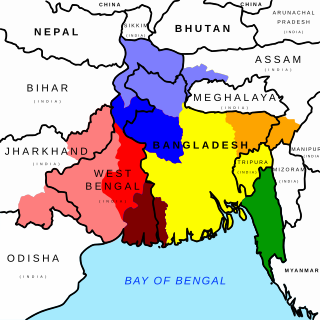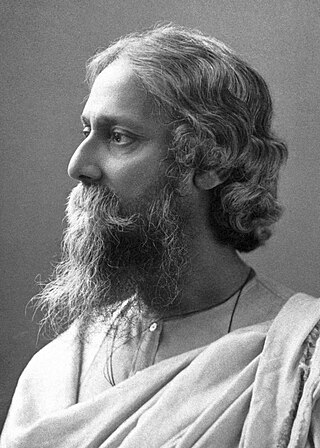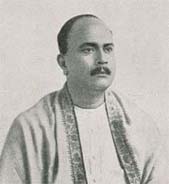Related Research Articles

Bengali music comprises a long tradition of religious and secular song-writing over a period of almost a millennium. Composed with lyrics in the Bengali language, Bengali music spans a wide variety of styles.

The Pashchimbanga Bangla Akademi is the official regulatory body of the Bengali language in India. It was founded on 20 May 1986 in Kolkata to act as the official authority of the language and is entrusted with the responsibility of reforming Bengali spelling and grammar, compiling dictionaries, encyclopedias and terminologies and promoting Bengali language and culture in West Bengal. They are widely accepted by the Governments of West Bengal and Tripura as well as a considerable number of private publishing houses and institutions such as the Oxford University Press and the Ramakrishna Mission.

Bengali literature denotes the body of writings in the Bengali language and which covers Old Bengali, Middle Bengali and Modern Bengali with the changes through the passage of time and dynastic patronization or non-patronization. Bengali has developed over the course of roughly 1,400 years. If the emergence of the Bengali literature supposes to date back to roughly 650 AD, the development of Bengali literature claims to be 1600 years old. The earliest extant work in Bengali literature is the Charyapada, a collection of Buddhist mystic songs in Old Bengali dating back to the 10th and 11th centuries. The timeline of Bengali literature is divided into three periods: ancient (650–1200), medieval (1200–1800) and modern. Medieval Bengali literature consists of various poetic genres, including Hindu religious scriptures, Islamic epics, Vaishnava texts, translations of Arabic, Persian and Sanskrit texts, and secular texts by Muslim poets. Novels were introduced in the mid-19th century. Nobel laureate Rabindranath Tagore is the best known figure of Bengali literature to the world. Kazi Nazrul Islam, notable for his activism and anti-British literature, was described as the Rebel Poet and is now recognised as the National poet of Bangladesh.

Barindra Kumar Ghosh or Barindra Ghosh, or, popularly, Barin Ghosh was an Indian revolutionary and journalist. He was one of the founding members of Jugantar Bengali weekly, a revolutionary outfit in Bengal. Ghosh was a younger brother of Sri Aurobindo.
The Ananda Puraskar is an award for Bengali literature awarded annually by the ABP Group to writers using Bengali, usually from West Bengal, India.

Pathuriaghata is a neighbourhood of North Kolkata in Kolkata district, in the Indian state of West Bengal. It is one of the oldest residential areas in what was Sutanuti. Once the abode of the Bengali rich, the neighbourhood and its surrounding areas are now dominated by Marwaris. Even in the 21st century the area is replete with colonnaded mansions.

The Noakhali riots were a series of semi-organized massacres, rapes and abductions, combined with looting and arson of Hindu properties, perpetrated by the Muslim community in the districts of Noakhali in the Chittagong Division of Bengal in October–November 1946, a year before India's independence from British rule.

The 1964 East Pakistan riots refer to the massacre and ethnic cleansing of Bengali Hindus from East Pakistan in the wake of an alleged theft of what was believed to be the Prophet's hair from the Hazratbal shrine in Jammu and Kashmir in India. The salient feature of the pogroms was its urban nature and selective targeting of Bengali Hindu owned industries and merchant establishments in the capital city of Dhaka. This resulted in unending waves of Bengali Hindu refugees in neighbouring West Bengal. The refugee rehabilitation became a national problem in India, and hundreds of refugees were resettled in Dandakaranya region of Odisha & Madhya Pradesh.
Kumar Roy (1926–2010) was a Bengali theatre actor, director and playwright. In 1983 he won the Sangeet Natak Akademi Award. He was associated with the group Bohurupee. In 1989 he directed the re-creation of the classic play Nabanna (1948). He was the president of the PashchimBanga Natya Akademi from 2006 till his death in 2010. Kumar Roy was also professor of drama at Rabindra Bharati University, Kolkata and visiting professor at Sangeet Bhavan, Visva-Bharati, Santiniketan.

Hemanta Kumar Sarkar was an Indian philologist, author, biographer, editor, publisher, union leader, leader of the Indian freedom movement and an associate of Subhas Chandra Bose. He was a close friend and the first biographer of Subhas Chandra Bose, the co-founder of Labour Swaraj Party in Bengal along with Muzaffar Ahmed and Kazi Nazrul Islam and led the movement for the Partition of Bengal and formation of Bengali Hindu homeland in 1947.

Atul Prasad Sen was a Bengali composer, lyricist and singer, and also a lawyer, philanthropist, social worker, educationist and writer.

Chinmoy Guha is Professor Emeritus at the University of Calcutta, a Bengali essayist and translator, and a scholar of French language and literature. He has served as the Vice-Chancellor of Rabindra Bharati University and Director of Publications, Embassy of France, New Delhi. Earlier he taught English at Vijaygarh Jyotish Ray College in Kolkata for more than two decades, and French at the Alliance Française and the Ramakrishna Mission Institute of Culture for eleven and five years respectively.
Utpal Kumar Basu was a Bengali poet and story teller.

Madhuri Chattopadhyay was a Bengali singer from Kolkata, who sang numerous songs in popular Bengali language during the 1960s, 70s and 80s. Madhuri Chattopadhyay will forever be remembered for her contribution in Geet, Gazal, Bengali Modern Songs, light Classical songs, Najrul Geeti and Rabindra Sangeet. She was playback singer for a few Bengali movies. She also published album in Shyama Sangeet in later years.
Vibekananda Mukhopadhyay was an Indian Bengali journalist and author. He is best known for Dwitiya Mahajuddher Itihas a three volume book Indian view of World War II. As an activist, he was deeply involved in all the national and international movements of his time. The Government of India awarded him Padma Bhushan, the third highest Indian civilian award, in 1970.
Akhilbandhu Ghosh was a Bengali male singer from Kolkata, West Bengal, India. He is considered as one of the greatest exponents of Bengali classical based vocal music.
Krishna Dhar was an Indian poet, playwright, writer, journalist, columnist and teacher. He wrote poetry alongside verse drama, nonfictional prose of varied nature and journalistic columns from the mid 1940s.

Gopbhum or Gopbhumi is a historical region of West Bengal state in Eastern India. It included the area between the Ajay and Damodar rivers, which is present-day Purba Bardhaman, Paschim Bardhaman, and also some parts of Birbhum, and Bankura districts of West Bengal. English translation of the word 'Gopbhum' is 'The land of Gopa'.
References
- ↑ "Dainika basūmatī Dainik basumati". Library of Congress, Washington, D.C. 20540 USA. Retrieved 2024-06-18.
- ↑ "Centre to take over Basumati". The Indian Express. 2011-06-03. Retrieved 2024-06-18.
- 1 2 3 "Basumati brought back to life". The Telegraph. Kolkata. 1 April 2012. Archived from the original on 24 June 2021. Retrieved 15 April 2013.
- ↑ VivekaVani (2012-12-22). "Upendra Nath Mukhopadhyay". VivekaVani. Retrieved 2024-06-18.
- ↑ Service, Statesman News (2013-08-06). "Basumati turns 100". The Statesman. Retrieved 2024-06-18.
- ↑ "Bengali daily suspends publication". The Hindu . Chennai. 3 January 2003. Archived from the original on 29 June 2013. Retrieved 15 April 2013.
- ↑ Dasgupta, Sanjukta. "A horrendous tale". www.thestatesman.com. The Statesman. Archived from the original on 18 January 2022. Retrieved 18 January 2022.